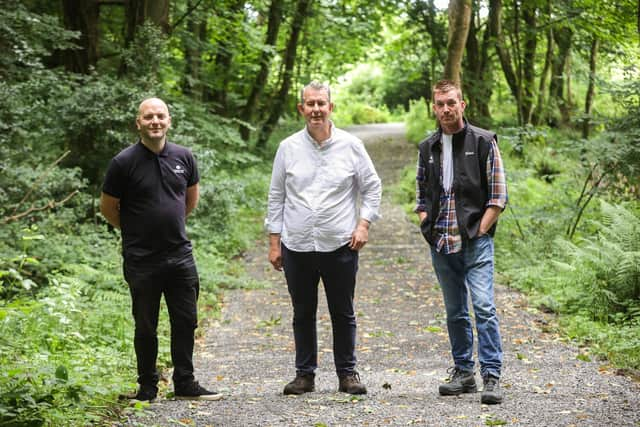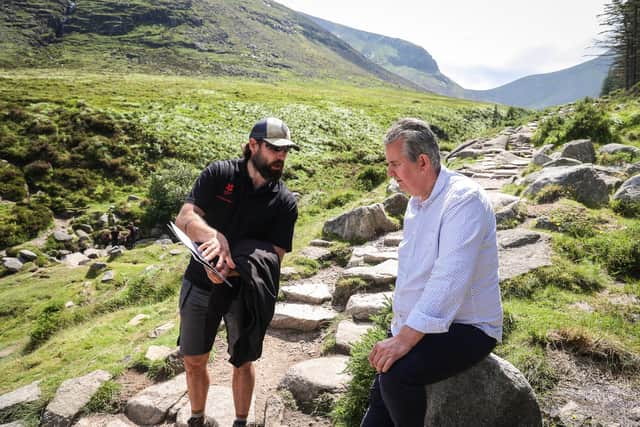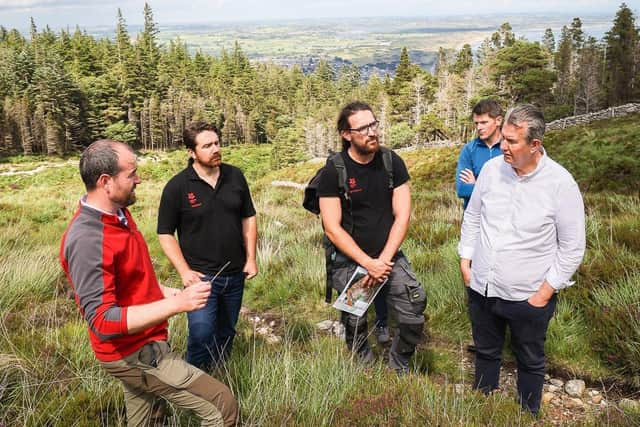New £4,000,000 investment will boost 47 environmental projects
and live on Freeview channel 276
The minister said that thanks to his department’s Environment Fund, 47 projects, including nature-rich trails, coastline protection and restoration of peatlands will now go head.
He made the announcement during a visit to Mourne Park, which was recently purchased by the Woodland Trust with support from DAERA’s Environment Fund (EF).
Advertisement
Advertisement
“Visiting Mourne Park today was incredible and a great chance to see how our Environment Fund has helped in the restoration of this special place of ancient woodland,” Mr Poots commented.


“It is being managed in a way that will safeguard this special landscape that includes the flora, fauna and the views into and out from this gem of a site.
“And, I believe today’s £4million announcement will deliver similar benefits by supporting Green Growth and proactively delivering opportunities so that people can spend time enjoying nature which benefits mental health and well-being.
“It brings to £7million the total amount of funding DAERA has invested this year alone in these environmental partnerships between the community, government and businesses.
Advertisement
Advertisement
“It shows that collectively we are doing all that we can to actively protect and enhance our varied countryside and wildlife,” he added.


Mr Poots said applications for the new EF funding were received from a range of ‘not for profit’ organisations and councils to help with nature recovery and to help connect people with nature.
“Projects range from the creation of nature-rich trails and walkways to outdoor recreation facilities which benefit our communities, to protection of our coastline and the restoration of peatlands and habitats.
“This collective working is exemplified by the Mourne Wildfire Recovery Project, which I have also visited today to see the excellent collective work being done.
Advertisement
Advertisement
“I want to thank the National Trust for its unwavering commitment to restore the habitat on the Mournes following last year’s devastating wildfires.


“There is more work required however the message is prevention is better than cure so please over the holidays continue to enjoy the outdoors but be responsible in how you do it,” the minister added.
Andrew Corkill, the National Trust’s Mournes Project Manager, said: “We were delighted to welcome Minister Poots back to Slieve Donard to meet our Wildfire Resilience Rangers to see how the work we are undertaking is helping habitats and wildlife to recover from the wildfire in April 2021.
“We showed him how we’re using GPS collars on some of the sheep to monitor their grazing patterns on areas recovering from the fire, and explained how we’re using technology to help with monthly ASSI habitat monitoring.
Advertisement
Advertisement
“We’re seeing skylarks, meadow pipits and other wildlife return to the area.
“This is all essential work which we undertake as a conservation charity to ensure that this special place is accessible for the local community and visitors to enjoy now and in the future.
“Without the significant funding support from DAERA it would not be possible to carry out this work,” Andrew concluded.
Ian McCurley, Director of Woodland Trust Northern Ireland, thanked DAERA for funding of £972,000 which contributed towards the Woodland Trust purchasing land within Mourne Park.
Advertisement
Advertisement
He said: “We are beyond excited to add land within Mourne Park, which is an incredibly special place, to our estate.
“This is a once-in-a-lifetime opportunity for the Woodland Trust in Northern Ireland allowing us to fulfil our vision of protecting and restoring ancient woodland.
“There are 73 hectares of precious ancient woodland in Mourne Park alone, which is phenomenal to find in Northern Ireland as it is so rare.
“The restoration work that has already begun involved clearing the invasive species so that more light can reach the forest floor, so that plants like bluebell, wood anemone can survive, and also allow the trees to regenerate naturally.
Advertisement
Advertisement
“To be able to protect woodlands on this landscape scale means more for nature, more for climate change and more for people.
“Work to reinstate historic walking paths and improve access in a sensitive way is also underway in anticipation of welcoming our first visitors later this summer,” he ended.